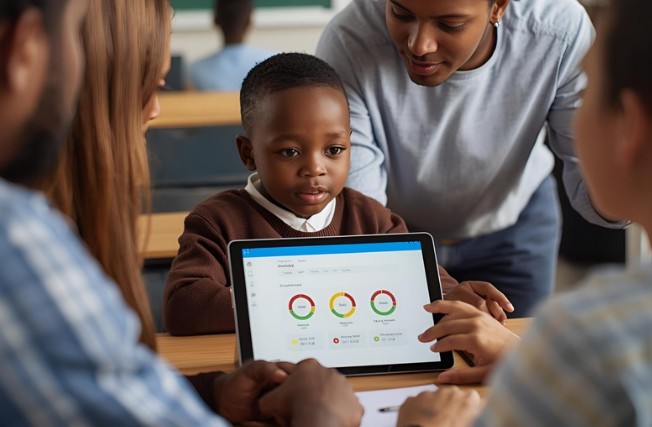Understanding the Great Educational Shift
If you're a parent in Kenya, you've likely heard about the Competency-Based Education (CBE) transition. This isn't just another educational reform it's a fundamental shift from the traditional 8-4-4 system that has shaped Kenyan education for decades. As parents, this change can feel overwhelming, but understanding what's happening and how to support your child through this transition is crucial.
What is CBE and Why the Change?
The 8-4-4 system focused on:
- Rote memorization and standardized testing
- Time-based progression (everyone moves at the same pace)
- Subject-based learning with clear boundaries
- Final examinations determining advancement
CBE shifts the focus to:
- Competency mastery over time-based progression
- Individualized learning paths based on student needs
- Integrated learning across subjects
- Continuous assessment and portfolio building
The Parent's Dilemma: "How Do I Know My Child is Progressing?"
This is perhaps the most common concern parents express. In the 8-4-4 system, you had:
- Clear report cards with grades and rankings
- Predictable exam schedules
- Simple A-F grading that was easy to understand
With CBE, the landscape changes dramatically. Instead of grades, you'll see:
- Competency descriptors (Developing, Approaching, Meeting, Exceeding)
- Learning portfolios showcasing student work
- Progress tracking across multiple competencies
- Individual learning goals and achievements
Real Parent Concerns We've Heard
"How will I know if my child is falling behind?" - Sarah M., Parent from Nairobi
"The new system seems so complex. How can I help my child at home?" - John K., Parent from Mombasa
"Will my child be prepared for university with this new system?" - Grace W., Parent from Kisumu
EduPoa™ Parent Portal: Your CBE Navigation Tool
This is where EduPoa™'s Parent Portal becomes your lifeline. We've designed it specifically to address the confusion parents face during this transition.
Real-Time Competency Tracking
Instead of waiting for quarterly report cards, you can now:
- Monitor daily progress across all learning areas
- View competency development in real-time
- Track specific skills your child is mastering
- Identify areas needing support before they become problems
Simplified Assessment Explanations
Our portal translates complex CBE assessments into parent-friendly language:
- Clear competency descriptions with examples
- Visual progress indicators showing development
- Actionable insights on how to support learning at home
- Teacher communication tools for direct collaboration
Practical Tips for Supporting Your Child Through CBE
1. Focus on Competencies, Not Grades
Instead of asking "What grade did you get?", try:
- "What competency are you working on today?"
- "Can you show me evidence of your learning?"
- "What skills did you practice today?"
2. Celebrate Process Over Product
CBE values the learning journey. Celebrate:
- Effort and persistence
- Problem-solving attempts
- Creative thinking
- Collaboration skills
3. Create a Learning Portfolio at Home
Help your child maintain a portfolio of:
- Projects and assignments
- Reflections on learning
- Photos of hands-on activities
- Audio/video recordings of presentations
4. Stay Connected with Teachers
Use EduPoa™'s communication features to: - Schedule regular check-ins - Ask specific questions about competencies - Share home observations - Collaborate on learning goals
Common CBE Terms Every Parent Should Know
- Competency
- A combination of knowledge, skills, and attitudes that students need to demonstrate
- Learning Outcome
- Specific statements describing what students should know and be able to do
- Assessment for Learning
- Ongoing assessment that helps improve learning rather than just measure it
- Portfolio
- A collection of student work that demonstrates learning and competency development
- Rubric
- A scoring guide that describes performance levels for different competencies
Addressing the "University Preparation" Concern
Many parents worry that CBE won't prepare students for university. However, research shows that CBE graduates often have: - Stronger critical thinking skills - Better problem-solving abilities - Enhanced communication skills - Greater self-direction in learning
Universities worldwide are increasingly recognizing these competencies as valuable preparation for higher education.
Success Stories: Parents Who've Navigated the Transition
"EduPoa™'s Parent Portal helped me understand my daughter's progress in ways I never could before. I can see exactly which competencies she's mastering and where she needs support." - Mary N., Parent
"The real-time tracking gave me peace of mind. I no longer worry about my son falling behind because I can monitor his progress daily." - David L., Parent
Your Action Plan: Getting Started with CBE
- Familiarize yourself with core CBE terminology and concepts
- Confirm whether your school uses EduPoa™ and, if so, request Parent Portal access from the school
- Meet your child’s teacher to discuss current competencies and goals
- Create a supportive home environment that encourages practice of specific competencies
- Stay informed through school updates and (where available) Parent Portal checks
Schools: Interested in empowering families during the CBE transition? Request an EduPoa™ demo.
Parents: Ask your school whether they use EduPoa™ and how to get access.

Leave a Comment